About 20% or 22-26 questions in CLAT entrance test are asked from the Logical Reasoning. By asking this type of question, the conducting body ‘The Consortium of National Law Universities’ evaluates a candidate’s ability to analyse arguments, identify patterns, and draw logical conclusions. Since a strong grasp on this question type is so important, we are offering CLAT Logical Reasoning practice test for free.
By taking a regular practice test on logical reasoning for CLAT, you will learn to tackle such questions efficiently. Click on the “Start Test” button to begin the test for free.
|
Key Features |
|
|
Topic-Wise Logical Reasoning Practice Test Online for CLAT
The CLAT entrance test is more about skill testing than assessing how many questions you can solve. Most of the questions are passage-based and they focus on assessing a candidate’s critical thinking. There is no set of topics you must cover, but solve as many core areas as possible.
Here are some of the key topics you must focus:
These important CLAT logical reasoning topics are curated based on the past exam patterns and a few CLAT preparation study materials. Note that don't be stuck in counting the total number of topics rather think of it as a set of interconnected skills and reasoning patterns you need to master. Our Logical Reasoning practice test online for CLAT will help you master this section for free.
CLAT Logical Reasoning Practice Test with Answers
Each practice set has questions between 10 to 15 that must be answered in 10 to 15 minutes. It is very likely that some of the questions will be challenging to tackle, but you want to know their answer at the end of the test. Therefore, our team has prepared the CLAT Logical Reasoning practice test with answers so that you can find the solutions to learn & improve. (Read instruction number 6 when starting the practice test.)
Also, there is a negative marking so, you won’t like to do the guesswork, but eventually you would like to know the answers to the questions you skipped. The given solutions will help you at that moment.
Procedure To Attempt The CLAT Logical Reasoning Practice Test Online On Our Website
Below are a few steps that you must take one by one to complete the attempting procedure of the CLAT Logical Reasoning practice test.
- Reach our website SelfStudys by typing www.selfstudys.com on any browser.

- At the platform, you should click on the ‘Navigation’ tab first.
- This will help you access our main menu from where you can select the ‘CLAT’ section.
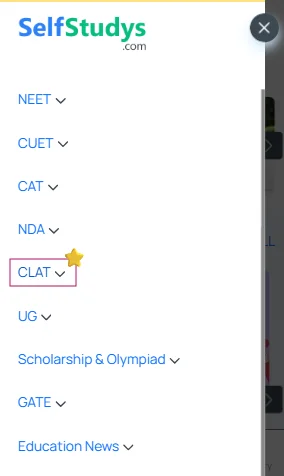
- A new menu will appear wherein you have to tap on the ‘CLAT Chapter-Wise Practice Test’ icon.
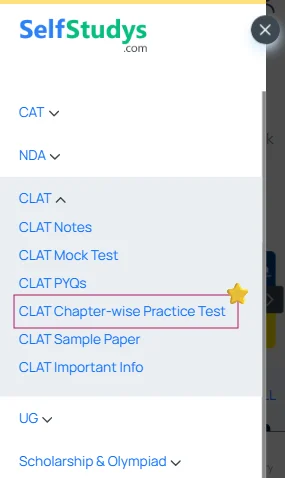
- Now, your browser will showcase a new web page that has section-wise practice tests. Here, you can easily select the CLAT Logical Reasoning practice test online.
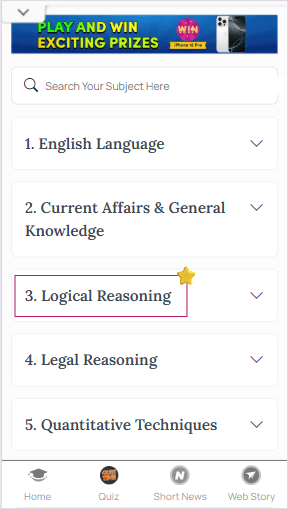
- Then, in the drop-down menu of practice test on logical reasoning for CLAT, you can choose the topic that you want to attempt.
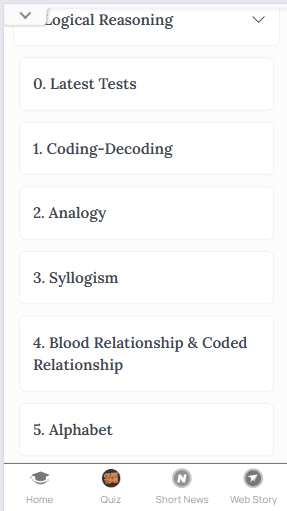
- A series for the CLAT Logical Reasoning practice test free on your chosen topic will now open up.
- You just have to click on the ‘Start Test’ icon of any Logical Reasoning practice test online for CLAT and begin solving the questions.
Note: For the CLAT Logical Reasoning practice test with answers result, do a Google Log In or Sign Up beforehand.
What Skills Are Tested in CLAT Logical Reasoning Sections?
In this section, we will learn what is the purpose of the Logical Reasoning section in the CLAT test and why nearly 20% questions are from this section.
The whole purpose of the CLAT entrance test is to find those who can think like a lawyer, comprehend complex information easily and form logical arguments. Through CLAT questions or sections, the conducting body wants to assess these skills:
1. The Ability to Recognise and Identify Arguments
As a lawyer, you have to present arguments in court and the judges will write judgments based on arguments. Hence, before you challenge or support your argument you first have to clearly see what the main point is and what reasons are being used to back it up. If you can't find the conclusion or the premises, you're lost. This is where the ability to recognise and identify arguments become useful and via CLAT Logical Reasoning sections, they want to know your potential to use this skill.
2. Analysing Reasoning Patterns
In legal analysis, you will need the skill to spot faulty logic because legal arguments vary in strength. This is a crucial skill that is being examined through Logical Reasoning questions. The Consortium of National Law Universities wants to understand whether you know your own argument is strong enough to win a case, or if the opposing side's argument is weak enough to be challenged.
TL;DR with the CLAT Logical Reasoning practice test you will master the skill of analysing reasoning patterns.
3. Evaluate Assumptions
Since in law, assumptions are everywhere. It is actually like a hidden bridge that connects premises to the conclusion and if the assumption is not true the argument falls apart. Having the skill of spotting assumptions helps you find the weak points in an argument.
4. Draw Inferences and Conclusions
This is the foundational skill for understanding the legal texts and arguments. This skill helps to take the information from the given passage and figure out what must be true whether it is directly stated or not.
5. Find Relationships and Analogies
The skill helps to find how different ideas, events, people, or concepts in a passage are connected to each other.
6. Assess Arguments
This skill is helpful to understand the overall quality of an argument. And to evaluate whether is it a good argument or not? If yes then why and if not then why not? This practice can be easily done by solving lots of practice test on logical reasoning for CLAT for free. You can use the links we provide on this page.
7. Find Contradictions
In law spotting inconsistencies is an important skill as it helps with identifying unreliable information and problematic legal provisions. Eventually, it helps in identifying loopholes. So, a candidate must have a strong grasp on finding contradictions because evidence must be consistent.
How to Prepare Yourself for the Logical Reasoning Practice Test Online for CLAT?
Even with a month of exam preparation, you can try to take the CLAT Logical Reasoning practice test online for free at Selfstudys. However, if you want to have a strong or 10/10 level of preparation, you can do the following:
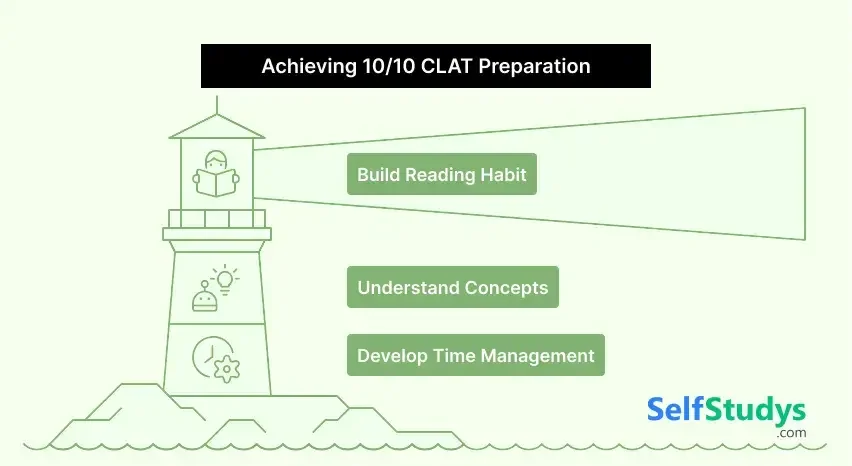
1. Build a Strong Reading Habit
In the CLAT test paper or practice test, you will find 4–6 passages of about 300–450 words each followed by MCQs. To read them first you need to have focus and patience because the Logical Reasoning questions aren't about reading plain text, you have to read them strategically. During your preparation or before solving the CLAT Logical Reasoning practice test free, focus on non-fiction. Referring to the editorials, opinion pieces, and analytical articles from top-level newspapers are suggested here. For this, you can refer to The Hindu, The Indian Express, The Guardian, The New York Times, The Economic Times editorials and you can also consider legal news portals.
Keep in mind these four types of reading methods (Actively Engage, Identify Structure, Vocabulary Building, Speed Reading with comprehension) while building this habit.
2. Understand Concepts (Memorisation Won’t Help)
In CLAT, no question will be the same so it will be a waste of time and energy to invest in memorisation techniques. Therefore, focus on 'why'. Try to understand why a particular argument is strong or weak. Learn about deductive and inductive reasoning. You can deepen this skill while solving the practice test too.
3. Develop Time Management Skill
Every time you come across a set of questions, prioritise easier passages first to get quick marks. You can allocate 10-20 minutes/passage to avoid being hurried through multiple sections. To develop this skill for CLAT, ensure you set per-question limits, practice with a timer and don't get stuck on one question.
Conclusion
Logical Reasoning practice test online for CLAT is something you shouldn’t avoid while preparing for the entrance test. Keep in mind that around 20% questions will be from Logical Reasoning and you will be assessed based on various skills. Dedicate yourself to taking practice tests on logical reasoning for CLAT and use the solutions to improve your mistakes and learn from it. Eventually, you will feel confident in such a question.







 Profile
Profile Signout
Signout














 Quiz
Quiz
 Get latest Exam Updates
Get latest Exam Updates 










